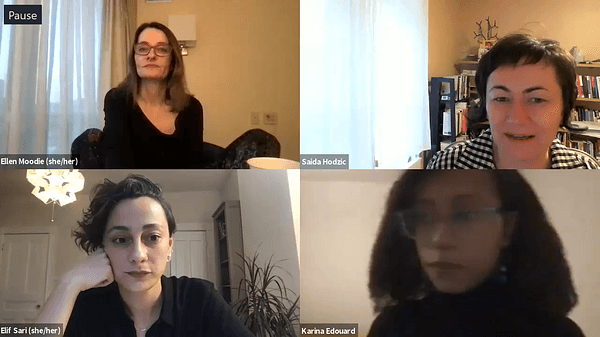Would you like to see your presentation here, made available to a global audience of researchers?
Add your own presentation or have us affordably record your next conference.
keywords:
truth
refugees
engagement
Truth, Responsibility, and Accountability in Asylum Engagements: Refugee Epistemology and Fugitive Anthropology This panel, comprised of anthropologists who critically examine the system of political asylum and simultaneously engage with it as expert witnesses, interpreters, and mediators, aims to challenge anthropology to think more radically, capaciously, and, fugitively about anthropological engagements with asylum. We are inspired by calls for a fugitive anthropology as an embodied, radical feminist praxis that rethinks “the contours of the political in co-creating spaces of liberation and transformation” and that “seeks to advance a decolonized discipline, yet at the same time takes flight from that contested space we claim as our intellectual home” (Berry et al. 2017). A fugitive anthropology of asylum engagements, as Rosas writes, “code-switches for other ends, other constituencies,” across “real and imagined borders” (2018). We seek to reimagine anthropology to meet the demands of the present moment in which global apartheid, and specifically, the closing of borders to refugees and asylum seekers has been become an acceptable, while still contested, international norm. To stay engaged with asylum requires us to stay alert to the slow but steady killing of refugee protections and the letting die of asylum seekers. It also requires us to question the epistemology of whiteness that dominates anthropological debates about the ethics of asylum engagements, an epistemology premised on privileging the accountability to the discipline and the presumed social location of the anthropologist as a normative citizen. Anthropological engagements with asylum are often said to bring truth and responsibility into crisis. We write, translate, and mediate for the courts and governmental agencies, and are accountable to asylum seekers. To conceive of these arrangements as crisis-inducing is to accept the epistemology that holds not being at risk as a starting point and the end goal. This panel does not celebrate asylum engagements but understands them as a complex site for unsettling normative disciplinary self-understandings and formulating alternative • refugee, feminist, queer, and fugitive • political epistemologies for the present. Berry, Maya J., Claudia Chávez Argüelles, Shanya Cordis, Sarah Ihmoud, and Elizabeth Velásquez Estrada. 2017. “Toward a Fugitive Anthropology: Gender, Race, and Violence in the Field.” Cultural Anthropology 32, no. 4: 537•65. Rosas, Gilberto. 2018. "Fugitive Work: On the Criminal Possibilities of Anthropology." Hot Spots, Fieldsights, September 26. https://culanth.org/fieldsights/fugitive-work-on-the-criminal-possibilities-of-anthropology

